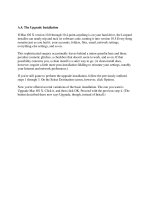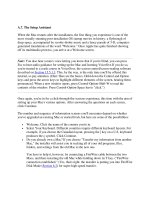Tài liệu Independent Contractors the essential handbook ppt
Bạn đang xem bản rút gọn của tài liệu. Xem và tải ngay bản đầy đủ của tài liệu tại đây (1.55 MB, 84 trang )
Copyright
Except for the Department of Industry, Innovation, Science, Research and Tertiary
Education logo, Commonwealth Coat of Arms, Business.gov.au logo, any material
protected by a trade mark, and where otherwise noted, this copyright work is licensed
under a Creative Commons Attribution 3.0 Australia licence. To view a copy of this
licence, visit:
/>In essence, you are free to copy, communicate and adapt the work, as long as you
attribute the work to the Commonwealth of Australia (Department of Industry, Innovation,
Science, Research and Tertiary Education) and abide by the other licence terms. For
terms of use of Coat of Arms (if permitted) contact the licensor/agency.
Disclaimer
Please note that every effort has been made to ensure that information provided in this
guide is accurate. You should note however, that the information is intended as a guide
only, providing an overview of general information available to independent contractors.
This guide is not intended to be an exhaustive source of information and should not be
seen to constitute legal advice. You should, where necessary, seek your own legal
advice for any legal issues raised in your business affairs.
i
Independent Contractors
the essential handbook
Introduction
You’ve picked up this handbook because you hire
contractors, or you are a contractor, and you want clear,
concise information about your rights and responsibilities.
Across Australia, almost a million men and women earn a
living by contracting out their services.
This plain-English handbook goes a long way towards giving
businesses and the independent contractors they engage a
simple guide to the rules and regulations and the rights and
obligations on both sides.
As well as containing a lot of useful information, this
handbook – the first of its type – includes links to important
websites, and phone numbers, to make sure all readers have
easy access to the facts.
Independent Contractors the essential handbook
ii
Language and communication
assistance
If you want to communicate with the hirer or the Independent
Contractors Hotline in your own language, there are private
and government services available. If you have a hearing or
speech impairment, the National Relay Service can assist.
If you are visually impaired the Independent Contractors
Hotline can help.
Find an interpreter
• To speak to the hirer through an interpreter call the
Translating and Interpreting Service (TIS) National on
13 14 50. TIS National provides interpreting services in
around 170 languages and dialects and is available seven
days a week. Note, that charges will apply unless the
hirer has agreed to pay for interpreting services under your
contract. For more information about TIS National, visit
www.immi.gov.au and search for ‘TIS National’. Before
you call have the name and phone number of the person
or service ready to give to the operator.
iii
Find a translator
If the language used in the contract is not one you’re fluent in,
consider getting it translated. You will need to find a private
translator to do this.
• Look under ‘translators’ in your local telephone directory.
Use an online directory, such as those on the following
websites:
• National Accreditation Authority for Translators and
Interpreters at www.naati.com.au.
• Australian Institute of Interpreters and Translators
Incorporated at www.ausit.org.
Assistance for the hearing and speech impaired
If you are deaf or have a hearing or speech impairment you
can call through the National Relay Service.
• TTYusers: Call 13 36 77 for the cost of a local call or
1800 555 677 if you are calling a toll-free number.
• SpeakandListen(speech-to-speechrelay)users:
Call 1300 555 727 for the cost of a local call or
1800 555 727 for toll free numbers. Alternatively, you can
make a call through the National Relay Service website at
www.relayservice.com.au.
This book is available in Audio Format
from business.gov.au/contractors
Independent Contractors the essential handbook
iv
Latest edition
This handbook will be updated regularly. To ensure you have
the latest information, visit business.gov.au, the Australian
Government’s award winning business website.
Please note that every effort has been made to ensure that information provided
in this Handbook is accurate. You should note however that the Handbook is
intended as a guide only, providing an overview of general information available
for independent contractors. This Handbook is not intended to be an exhaustive
source of information and should not be seen to constitute legal advice.
You should, where necessary, seek your own legal advice for any legal issues
raised in contracting.
v
Table of contents
Language and communication assistance ii
Contracting arrangements
Are you an independent contractor or employee? 2
Contracts 6
Occupational Health & Safety 10
Workers’ Compensation 12
Insurance 14
Superannuation Guarantee 17
Intellectual property (IP) 19
Dispute resolution 22
Collective bargaining 26
Anti-discrimination 28
Information specific to
independent contractors
Business planning 32
Establishing a contracting relationship 35
Incorporating your business 40
Training and licensing 42
Personal services income taxation 44
Goods and Services Tax 46
Information specific to hirers
Engaging independent contractors 50
Payroll tax 52
Checklist for independent contractors 54
Checklist for hirers 58
Australian Government agency list 61
State and territory agency lists 62
Glossary 67
Index 70
My notes 73
Independent Contractors the essential handbook
vi
1
Contracting
arrangements
Contracting Arrangements
1
Independent Contractors the essential handbook
2
Contracting arrangements
Areyouanindependentcontractoror
anemployee?
There are many differences between independent contractors
and employees – understanding these differences is crucial
for both independent contractors and their hirers as it can
have an effect on matters such as tax and superannuation
obligations, intellectual property ownership, and insurance
requirements.
Information for independent contractors
As an independent contractor you operate a business entity
that produces a result for an agreed price. There are key
differences between independent contractors and employees.
In most cases you are an independent contractor if you:
• are paid for results achieved
• provide all or most of the necessary materials and
equipment to complete the work
• are free to delegate work to others
• have freedom in the way you work
• provide services to other businesses
• are free to accept or refuse work
• are in a position to make a profit or loss.
3
Contracting arrangements
In contrast, employees receive entitlements from the Fair
Work Act 2009 (the Act). The Act provides for entitlements
such as:
• personal leave
• annual leave
• parental leave
• minimum rates of pay
• meal breaks.
However, employees have little control over the work
they perform, their place of work, and their work hours.
Generally a worker is an employee if he or she:
• is paid for time worked
• receives paid leave (for example personal, annual or
recreation, or long service leave)
• is not responsible for providing the materials or
equipment required to do the job
• must perform the duties of the job position
• agrees to provide their personal services
• works hours set by an agreement or award
• is recognised as an integral part of the employer’s
business
• takes no commercial risks and cannot make a profit or
loss from the work performed.
Independent Contractors the essential handbook
4
Contracting arrangements
To help you understand the difference between independent
contractors and employees at common law, use the online
decision tool at www.business.gov.au/contractors.
Even if you are an independent contractor and not an
employee, you need to be aware that some legislation may
treat employees and independent contractors in the same
manner.
As an independent contractor you may or may not choose
to join or not join a union eligible to represent your industrial
interests. However, it is illegal for hirers or unions to try
to influence your choice through threats, pressure or
discrimination. If you believe you are being pressured to make
a decision either way, get advice from a Fair Work Inspector
or union. They can help you get a court order for protection or
provide other assistance.
Information for hirers
As a hirer, you are required to withhold an amount from
payments to an independent contractor for tax purposes if:
• the contract asks for amounts to be withheld,
• they provide their work or services for a client of yours
under a labour hire arrangement, or
• they have not quoted their ABN to you.
You may also have obligations to your independent
contractors relating to payroll tax, workers’ compensation
and insurance. For more information on these obligations,
see the corresponding topics in this handbook. In some
cases the Superannuation Guarantee laws may also apply to
payments for work or services by an independent contractor.
See the Superannuation Guarantee topic on page 17 for
further information.
5
Contracting arrangements
As a hirer you are protected from unauthorised industrial
action by independent contractors. It is also unlawful for
unions to threaten or take unauthorised industrial action
against you. If you believe unauthorised industrial action
is being taken you can speak to Fair Work Australia on
1300 799 675.
What to do
• Call the Independent Contractors’ Hotline for information
on 1300 667 850.
• Visit the Fair Work Online website at
www.fairwork.gov.au for information on your rights and
obligations under Australia’s new Fair Work System.
• To help you understand the difference between a
contractor or employee at common law, use the online
decision tool at www.business.gov.au/contractors.
• Use the TaxOffice’s employee/contractor decision tool –
an online resource designed to help a hirer determine
whether a worker is an employee or an independent
contractor for tax and superannuation purposes at
www.ato.gov.au or phone 13 28 66.
• For more information about Superannuation Guarantee
obligations see the TaxOffice’s Superannuation
guarantee – How to meet your super obligations
(an employer’s guide) at www.ato.gov.au or
contact the Superannuation Infoline on 13 10 20.
Independent Contractors the essential handbook
6
Contracting arrangements
Contracts
A well planned contract allows independent contractors
and hirers to identify the working relationship, rights and
responsibilities, and expected outcomes before starting
work. It’s important for independent contractors and
hirers to understand their rights, obligations and what is
expected of them in the business relationship to prevent
misunderstandings.
When drafting a contract, both parties should consider
including the following information:
• results to be achieved and services to be performed
• insurance and professional indemnity responsibilities
• a clear dispute resolution process
• intellectual property rights
• termination of the contract
• timing and payment
• reporting arrangements
• confidentiality obligations
• provision of tools and equipment necessary to undertake
the work.
Independent contractors and hirers should be able to
understand the importance of having a written contract
and identify the key elements of a good quality contract. It
is essential that independent contractors and hirers are able
to fully understand the terms of the contract they are signing
and are aware of common issues which may arise during the
course of the contract. This allows both parties to minimise
any risks associated with signing a contract.
7
Contracting arrangements
Unfair contracts
Under the Independent Contractors Act 2006, an unfair
contract is one where a person performs work under terms
that are deemed ‘unfair’ or ‘harsh’.
When determining whether a contract is unfair or harsh,
a court may consider:
• the relative strengths of the bargaining positions of the
parties
• whether any undue influence or unfair tactics were used
against a party
• whether the contract provides total remuneration that is
less than that for an employee performing similar work;
and
• any other matter that the court thinks is relevant.
Where a court finds that a contract is unfair or harsh, it may
order that:
• thetermsofthecontractbere-written–forexampleto
add or remove clauses
• partsofthecontractwillhavenoeffect;and
• thecontractbesetaside–thatis,thatthecontract
ceases to operate.
Unfair contract claims must be brought to the Federal
Magistrates Court or the Federal Court of Australia.
It is recommended you consider dispute resolution prior to
lodging a claim. See the dispute resolution topic on page 22
for further information.
Independent Contractors the essential handbook
8
Contracting arrangements
Sham contracts
Sham contracting is where an employer tries to disguise
an employment relationship as an independent contracting
relationship. If this occurs an employee may not receive a
number of employment entitlements such as superannuation
and workers compensation.
Under the Fair Work Act 2009, the employer cannot:
• disguise an employment relationship or proposed
employment relationship as an independent contracting
arrangement
• dismiss or threaten to dismiss an employee to re-engage
him or her as an independent contractor
• knowingly make a false statement to persuade or influence
an employee to become an independent contractor.
An employer who behaves in this way can be fined up to
$33,000. Actions can be brought by a worker, a union or the
Fair Work Ombudsman.
9
Contracting arrangements
What to do
• Phone the IndependentContractors’Hotline on
1300 667 850 for information on unfair contracts.
• Read information on sham contracts on the Fair Work
Online website at www.fairwork.gov.au.
• See the Unfair Contracts fact sheet and Protection
Against Sham Contracting fact sheet on the
DepartmentofInnovation,Industry,Science
andResearch(DIISR) website at
www.innovation.gov.au/independentcontractors.
• Phone the FairWorkOmbudsman on 13 13 94 for
further information on sham contracting.
• Consult your union or industry association. You can find
unions and industry associations using the
business.gov.au government and business associations
directory at www.business.gov.au/directory.
Independent Contractors the essential handbook
10
Contracting arrangements
Occupationalhealthandsafety
Occupational health and safety or as it’s now known, Work
Health and Safety (WHS), refers to health and safety in the
workplace. Both independent contractors and hirers have
legal responsibilities under Work Health and Safety legislation,
which is governed by the Commonwealth, state and territory
agencies.
Information for independent contractors
If you employ or otherwise engage workers to carry out work
for your business or organisation, you are required to meet
legal responsibilities under the applicable WHS legislation.
As an independent contractor you are entitled to a safe and
healthy workplace. You should be given a safety induction
to the workplace and have relevant work processes clearly
explained to you.
As a worker, you are also required to comply with certain
duties set out under the WHS laws, for example:
• ensuring that your actions do not put yourself or
others at risk
• alerting the appropriate people to hazardous
workplace situations
• reporting accidents and injuries.
11
Contracting arrangements
Information for hirers
If you hire independent contractors, you are legally
responsible for ensuring their health and safety at all times
while in your workplace (to the extent that this is reasonably
practicable). For example, you should ensure that your
workplace, any machinery, substances and facilities used are
safe, and that all workers have adequate training, supervision
and are properly licensed if required.
What to do
• For more information about your OH&S rights and
responsibilities, contact the work, health and safety and
workers compensation agency in your state or territory.
You can find contact details at www.business.gov.au
(search for occupational health and safety).
• Refer to our workers’ compensation topic on page 12.
• Read about occupational health and safety on the
www.business.gov.au website.
Independent Contractors the essential handbook
12
Contracting arrangements
Workers’compensation
Workers’ compensation is covered by state or territory
laws which ensure benefits are paid to an employee or an
employees family if the worker suffers a job-related injury,
death or disease.
Information for independent contractors
You may not necessarily be entitled to workers’ compensation
unless you have arranged your own accident protection
insurance. Some independent contractors are covered
for workers’ compensation in some states and in specific
circumstances. To find out if you are covered, contact your
state or territory’s OH&S and workers’ compensation agency
which are listed on page 64.
Information for hirers
It is crucial that you know whether independent contractors
are covered by their own insurance or come under
your business insurance. If you do not provide workers’
compensation when you are required to, your state or territory
OH&S and workers compensation agency could require you
to pay back any avoided workers’ compensation premiums.
You could also be subject to serious penalties, which may
have a significant financial impact on your business. For more
information about who is covered, contact your state or
territory’s OH&S and workers compensation agency.
13
Contracting arrangements
What to do
• For more information about workers’ compensation
and the laws that apply, contact the OH&S and workers’
compensation agency in your state or territory. You can
find contact details on page 64.
• See our insurance topic on page 14 for further information
on workers’ compensation insurance.
Independent Contractors the essential handbook
14
Contracting arrangements
Insurance
Unlike employees, independent contractors are generally
responsible for their own insurance cover and bear the
commercial risk for losses suffered from any work performed.
Depending on the contract agreement, both the independent
contractor and the hirer may have liability insurance and
workers’ compensation obligations.
Information for independent contractors
Workers’ compensation laws are state and territory based.
They ensure that benefits are paid to an employee or their
family if the employee suffers a job-related injury, death
or disease. As an independent contractor, you may not
necessarily be entitled to the same workers’ compensation
benefits as regular employees. See the workers’
compensation topic on page 12 for further information.
Consider personal accident and illness insurance to ensure
that you are financially secure should any accident or illness
prevent you from working. Some independent contractors
are covered by workers’ compensation in some states and in
specific circumstances. To find out if you are covered, contact
your state or territory’s work, health and safety and workers’
compensation agency. Contact details are on page 64.
Liability insurance protects you against the financial risk of
being found liable to a third party for death or injury, loss or
damage of property or monetary loss resulting from your
negligence, your advice or your provision of unsafe products
or services. You can take out a number of different types
of liability insurance including public or product liability and
professional indemnity. As an independent contractor, it’s
extremely important that you consider liability insurance, as
the costs of being found liable or negligent can be extremely
high.
15
Contracting arrangements
Asset and revenue insurance provides protection in the event
of burglary, natural disaster, machinery breakdown and other
forms of damage. It’s likely that most of the equipment you
use during the course of your contract will be your own, so
you should consider asset and revenue insurance to help
minimise the financial risk.
If you work from home, you should ensure that you have
the correct level of insurance to protect your business.
In many cases, home and contents insurance does not
cover home-based businesses. In addition to the types of
insurance mentioned above, you should also ensure that
you are protected from incidents including natural disaster,
fire or theft. Many insurance policies don’t cover tools of
trade, office furniture or computer equipment used for your
business – you may need to advise your insurer that you
require cover for your business assets.
Information for hirers
As a hirer, you need to know whether the independent
contractors you have engaged are covered by your
business’s workers’ compensation and liability insurance.
Some public liability policies may exempt liability for injuries
to independent contractors, in which case independent
contractors would need to consider their own accident
protection insurance.
To prevent yourself or your business from being found
liable for any damage or injury caused by an independent
contractor you’ve hired, ensure that the insurance obligations
of both parties are clearly identified in the contract.
Independent Contractors the essential handbook
16
Contracting arrangements
What to do
• Contact your state or territory’s work, health and safety
and workers’ compensation agency to find out if you or
your worker is covered by workers compensation.
Contact details are on page 66.
• See the insurance topic at www.business.gov.au.
• Contact the Small Business Support Line for more
information about insurance on 1800 77 7275
• As an independent contractor, talk to a number of
insurance companies and brokers to discuss what
insurance options are best for you. Search the
business.gov.au government and business associations
directory for insurance and broker associations at
www.business.gov.au/directory or check the phone book.
17
Contracting arrangements
SuperannuationGuarantee
A number of factors determine who should pay
superannuation for an independent contractor. You need to
find out if you or your worker is classified as an independent
contractor for superannuation purposes. Hirers must pay
super contributions for independent contractors if they:
• are paid wholly or principally for their personal labour
and skills
• perform the contract work personally, and
• are paid for hours worked rather than to achieve a result
even if they quote an Australian Business Number (ABN).
Information for independent contractors
If your hirer is not legally required to pay your superannuation
contributions, it is your responsibility to pay your own.
You should factor this cost into the amount you charge for
your services.
If you are unincorporated, you can claim a deduction for
personal contributions made to a superannuation fund.
You may also be eligible for a super co-contribution if you
make personal super contributions.
If your business is incorporated, and you are a director, you
are responsible for your own superannuation. If you don’t
pay enough, or if you miss the payment cut-off dates, you
will have to pay the Superannuation Guarantee charge which
is a tax penalty.









